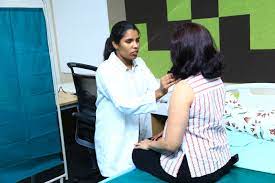In a groundbreaking 2019 study, it was revealed that clinical breast examinations conducted by Medical Tactile Examiners (MTEs) demonstrated an astonishing level of accuracy comparable to those carried out by licensed physicians. This significant finding has the potential to revolutionize the field of medical diagnostics and may even pave the way for enhanced accessibility to quality healthcare services for women all over the world.

Medical Tactile Examiners Worldwide:
Traditionally, mammography has been widely employed for the detection of breast cancer, but the introduction of medical tactile examiners has revolutionized the landscape by offering an alternative method that eliminates radiation exposure, making it safer for patients. Medical tactile examination, originally developed by German gynecologist Frank Hoffmann, has emerged as a groundbreaking approach in the detection of breast cancer.
In 2011, Hoffmann initiated a remarkable social endeavor known as “Discovering Hands,” aimed at empowering blind and visually impaired women through specialized training to become Medical Tactile Examiners (MTEs). Research indicates that individuals with blindness possess an exceptional sense of touch, making them ideal candidates for this novel and unique role. Through this standout program, MTEs are equipped with the skills to perform accurate clinical breast examinations, opening new avenues in healthcare accessibility and cost-effective diagnostics.
In Germany, the birthplace of the initiative, over 50 individuals have undergone training as medical tactile examiners, demonstrating the program’s success in producing skilled and competent professionals. Inspired by this success, other countries, including Austria and Switzerland, embraced the concept, aiming to enhance medical services in their regions.
Additionally, developing nations such as India, Colombia, and Mexico also sought to implement the program to uplift their healthcare capabilities, providing opportunities for blind women to become medical tactile examiners and contribute to their communities.
As the program’s reputation grew, its expansion into Colombia and Mexico was a testament to its potential to address breast cancer detection challenges worldwide. However, the outbreak of the COVID-19 pandemic forced both countries to suspend the initiative temporarily due to the unforeseen obstacles faced in global health efforts.
MTE: The Spread in India
Despite initial skepticism about the ability of blind women to perform such intricate tasks, the “Discovering Hands” initiative gained traction in India when the National Association of the Blind India Centre for Blind Women and Disability Studies (NABCBW) introduced it in 2017. Situated in Delhi, this center took on the mission of training medical tactile examiners, successfully graduating 18 proficient individuals with an additional eight currently undergoing training.
Shalini Khanna, the director of NABCBW, attested to her confidence in the program after witnessing the meticulous precision displayed by blind women during clinical examinations in Germany.

In pursuit of promoting comprehensive breast cancer screening in various regions of India, the National Association of the Blind India Centre for Blind Women and Disability Studies has been actively organizing screening camps since December 2022. Spearheading this transformative initiative are the Medical Tactile Examiners who are trained at the center, who have already screened over one thousand women, showcasing the program’s effectiveness and far-reaching impact.
The success of MTEs in clinical breast examinations, as highlighted in a 2019 study, has proven their proficiency to be on par with that of licensed physicians. This groundbreaking finding has further cemented the significance of medical tactile examiners in the realm of medical diagnostics, underlining their potential to enhance healthcare accessibility and affordability.
Training and Challenges:
However, the path to becoming an MTE is no easy feat. Prospective candidates undergo an intensive 9-month-long training, an integral part of which entails a 3-month internship at a medical facility. The rigorous training program serves to equip the women with the essential skills and knowledge needed for proficient clinical breast examinations.
The training curriculum spans a diverse array of subjects, including English language proficiency and computer science, crucial in ensuring that medical tactile examiners can effectively communicate and utilize modern technological advancements in their profession. Moreover, they delve into the complex intricacies of human anatomy and physiology, with a dedicated focus on breast cancer. By learning about various types of breast cancers and the diverse treatments and therapies prescribed by gynecologists and oncologists, the medical tactile examiners in training acquire a comprehensive understanding of the disease and its management.
While the “Discovering Hands” program stands as a beacon of hope and empowerment for blind women, it is not without its challenges. One of the most prominent hurdles is the prevailing educational landscape for blind students in India. A significant number of blind children lack access to science education in high school, making it arduous for them to pursue the necessary knowledge base to embark on this medical journey. NABCBW chief Shalini Khanna candidly acknowledges this obstacle, affirming that addressing the shortcomings in the education system is vital in successfully implementing the program on a broader scale.
‘Discovering Hands’ is a Discovery of Hope:
Despite such challenges, the resounding achievements of the “Discovering Hands” initiative resonate across the country, igniting optimism for the future of breast cancer screening and the role of blind and visually impaired women in healthcare. As the program continues to flourish, its impact extends beyond mere diagnostics, empowering blind women to contribute actively to society and healthcare, ultimately nurturing a more inclusive and compassionate medical community.
As the NABCBW’s breast cancer screening camps continue to traverse diverse corners of India, the profound dedication and competence of the medical tactile examiners breathe new hope into the fight against breast cancer. With each examination performed, the transformative power of “Discovering Hands” becomes more evident, paving the way for a future where healthcare knows no bounds, and opportunities for blind women flourish unabated.
The “Discovering Hands” project remains a beacon of hope for patients and aspiring MTEs alike, its profound impact resonating across nations. With an innovative and compassionate approach, this initiative continues to bridge the gap between healthcare inclusivity and empowerment of blind women. As the program adapts to evolving circumstances, the future holds immense promise for further expansion and refinement, fostering a world where medical tactile examination becomes an indispensable and priceless tool in the fight against breast cancer and beyond.













